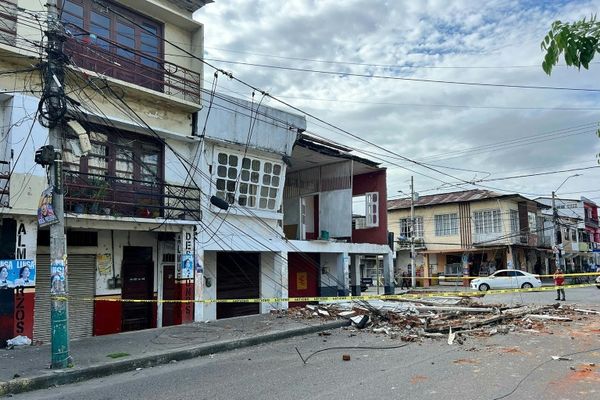WASHINGTON — Few specifics are known about what the FBI sought during Monday’s daylong search of former President Donald Trump’s Mar-a-Lago estate in Florida.
But one thing is clear: For federal investigators to seek a search warrant and conduct an unannounced search of the property while Trump was not present indicates they believe the evidence they sought was worth any expected political blowback.
The onslaught began quickly after the former president publicized the search, with his allies demanding more information and rallying around calls for an investigation of the events, which they decried as a partisan witch hunt and an abuse of power. Republican House leaders have promised to conduct investigations of the Justice Department and FBI if they win control of the House in November.
Justice Department officials have yet to comment publicly about the search, which Trump called a “raid” in a lengthy statement disclosing that it happened. And they may not, despite persistent demands from Republican lawmakers, given the department’s reluctance to acknowledge ongoing investigations.
The former president’s son Eric Trump said on Fox News on Monday night that federal investigators sought records that had not been handed over to the National Archives when his father left the White House. FBI agents would have left a copy of the search warrant, including an itemized list of what they sought and what was removed. Trump lawyer Christina Bobb told the Real America’s Voice streaming service that she was present during the search and agents told her they were looking for classified documents.
Violations of the Presidential Records Act have occurred before and are usually handled quietly, said presidential historian and George Washington University professor Matt Dallek, noting that the search raises questions about what was potentially in Trump’s possession that required such a response.
“Usually, former presidents are not treated essentially as hostile, uncooperative criminals,” Dallek said. “That’s what’s striking about it, that hostile quality to the investigation.”
Trump, who was in New York at the time of the search, said authorities broke open his safe. In his statement, he said Mar-A-Lago was “under siege, raided and occupied” and that “nothing like this has ever happened to a president of the United States before.”
The last point is correct. Since Congress enacted the law in 1978 in response to then-President Richard Nixon’s handling of papers related to the Watergate scandal, multiple presidents have violated it, taking home mementos, letters or gifts meant to go to the National Archives. But such situations are typically treated as misunderstandings, and the National Archives and the FBI have successfully negotiated with former presidents and their lawyers to recover the material without a fuss.
In February, the National Archives announced it had recovered 15 boxes of materials that Trump took with him to Mar-a-Lago rather than turning them over to be processed for eventual research and public viewing at a presidential library when he left the White House in 2021. The boxes reportedly included documents marked classified or top secret and some that had been destroyed. At the time, Trump called the recovery “routine” and “no big deal.”
The national archivist said in February that Trump representatives would continue to search for additional records. The agency also asked the Justice Department that month to examine whether criminal charges were warranted.
“After working and cooperating with the relevant government agencies, this unannounced raid on my home was not necessary or appropriate,” Trump said in his statement Monday.
Dallek said the search could be a sign that relations had broken down.
“I presume that whatever information or documents the FBI wanted, they believe had not been given to them, and that Trump was refusing to divulge ... all of the documents or give them back,” Dallek said.
Prosecuting a violation of the Presidential Records Act is difficult and rare. The statute gives the president broad discretion to decide what is a personal record and what is a presidential record. To prove a violation under the Presidential Records Act, prosecutors would have to prove the person intentionally mishandled the material or was grossly negligent in doing so.
Onetime Clinton administration national security advisor Sandy Berger, for example, was prosecuted and fined $50,000 for sneaking classified documents out of the National Archives in 2003.
The law has long been considered noncontroversial, with most presidents and their staffs working with the National Archives throughout their terms to determine what must be preserved for posterity, such as notes on drafting a speech, and what can be taken home, including medical records.
Now that he is out of office, Trump no longer has the power to declassify documents, said Georgetown University law professor David Super.
“Even if they are not classified, they are federal property and he took them,” Super said. “The act is very, very clear. The first thing it says is these are the property of the United States.”
Potential punishment under the act is a fine, up to three years’ imprisonment and a requirement that the person alleged to have violated the law “forfeit his office and be disqualified from holding any office under the United States.” The statute has never been applied to a president, whose qualifications are set in the Constitution, and Trump would likely spend years challenging the statute in court if he were charged.
Dallek said resorting to searching a former president’s home may indicate that the Justice Department thinks recovering the material is a matter of national security.
“One has to believe that the FBI is not securing a warrant and essentially conducting a hostile raid — including on the former president’s safe — to acquire some random State Department cable from somewhere out in the world,” Dallek said. “It’s got to be, at least in their eyes, extremely serious.”
Federal investigators likely had to meet a higher standard of proof before even getting permission to seek a warrant, former FBI Special Agent Ken Gray said.
“Nothing would be routine in a case involving doing a search of a former president’s residence. It is a totally unusual circumstance, but consequently, this is such a high-profile undertaking (that) the director of the FBI would have had to have reviewed this, and it would have gone up through DOJ up to the attorney general,” Gray said.
Before a warrant was issued, a District Court judge or federal magistrate would have reviewed the supporting affidavit detailing what evidence agents were looking for and what probable cause they had to believe that evidence of a crime would be found at Trump’s home, he said.
Federal agents reportedly wore plainclothes and were escorted through the estate, which also houses a private club, by the Secret Service.
Despite Republicans’ demands for transparency about what led to the search, Gray said it immediately became so politicized that he doesn’t expect the Justice Department to provide additional details anytime soon. Several political observers have speculated that the search could move up Trump’s announcement of a 2024 bid, and his super PAC was using it to raise money Monday.
“If President Trump had not made a big issue of this, we may not have even known this had happened,” Gray said.







